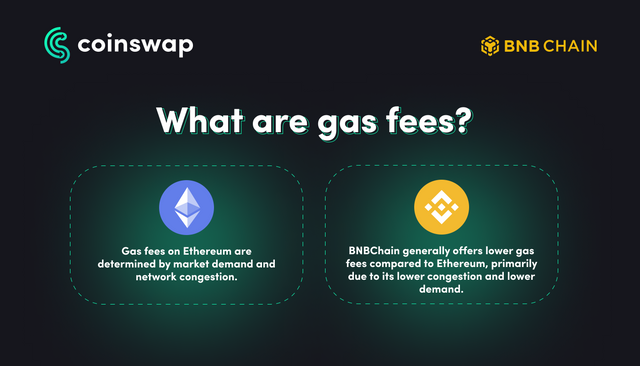
Gas fees ⛽️ are an essential aspect of the blockchain ecosystem, ensuring the smooth operation and security of transactions. In this article, we'll delve into what gas fees are and highlight the differences between Ethereum's gas fees and the Binance Smart Chain's (BNB) gas fees. 🚀
Gas fees, represented in cryptocurrency, are the costs associated with executing transactions and smart contracts on a blockchain network. They serve two primary purposes: preventing network abuse and compensating miners or validators who process and validate transactions. Gas fees are typically influenced by the network's congestion, transaction complexity, and the priority set by the user.
Ethereum, one of the most popular blockchain platforms, uses gas fees to allocate network resources and maintain its decentralized ecosystem. Ethereum's gas fees are denominated in Ether (ETH) and can fluctuate significantly based on network demand. During times of high activity, such as when popular decentralized applications (DApps) or decentralized finance (DeFi) protocols experience heavy usage, gas fees tend to rise due to increased competition for block space.
On the other hand, the Binance Smart Chain (BSC), a blockchain platform developed by Binance, offers an alternative to Ethereum with lower gas fees and faster transaction confirmation times. BSC uses its native cryptocurrency, Binance Coin (BNB), to pay for gas fees. This has made BSC an attractive option for users seeking more cost-effective transactions, especially for smaller-scale transactions and interacting with decentralized applications.
The difference in gas fees between Ethereum and BSC can be significant. Ethereum's higher fees are partly attributed to its larger user base and longer block confirmation times. In contrast, BSC's lower fees are a result of its more centralized consensus mechanism, which allows for faster block confirmations.
It's important to consider the trade-offs between Ethereum and BSC when choosing a blockchain network for your transactions. While Ethereum remains the go-to platform for its robust ecosystem and wide-ranging DApps, BSC offers a cost-efficient alternative, especially for users focused on smaller transactions or seeking faster confirmations.
In conclusion, gas fees play a crucial role in facilitating transactions and incentivizing network participants. Ethereum's gas fees, denominated in ETH, tend to be higher due to network congestion, while BSC's gas fees, denominated in BNB, offer a more cost-effective option. Understanding the differences in gas fees can help users make informed decisions when transacting on different blockchain networks. 🌐💸